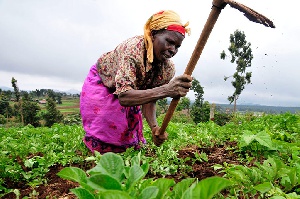Mrs. Cecilia Johnson, Chairman of the Council of State, has observed that seeking investors in Agriculture to increase local production and thereby reduce the country’s huge food imports, should remain focus of government.
She said it was important rice was produced locally, to enable the country cut back its huge imports, said to be about 500 million dollars annually.
Mrs. Johnson made the observation when she led 15 of the 25-member Council on a familiarization tour of major agricultural plantations along the Lower Volta Basin in the Volta Region.
Farms visited were the 1,100-hectare 30-million-dollar Brazil Agro-Business Group Limited farm, which now has 500 hectares planted, as well as GADCO Farms, both rice plantations in the South Tongu District.
Others were the 1,716 hectare Musahamat Farms, an American investment, currently planted with 240 hectares of banana and Prairie Volta Limited (PVL) rice farms, both at Aveyime in the North Tongu District.
Major obstacles cited by managers of the companies included land acquisition difficulties, lack of equipment and parts, appropriate seed, lack of professional hands and non-availability of chemicals.
“Increasing local production to cut import and spark employment and local incomes, and you the investors also making returns is the vision of government,” Mrs. Johnson said.
She said as a major government advisor, the Council’s visit was to acquaint itself with progress and challenges of the investments, to enable it (Council) appropriately prompt government.
Mrs. Johnson said members of the Council of State on the trip had been impressed about the farms and taken note of their difficulties.
She admitted the controversial Aveyime PVL rice farms, established with 30% government share, 30% GCB Bank and 30% American shares, needed capital injection, obsolete equipment replacement and young and professional hands to remain buoyant.
Nana Ato Dadzie, PVL Board Chairman, said the farm is facing challenges and needs about between 6 and 18 million dollars capital injection, to increase production increase cropping from 240 hectares to 700 hectares.
Mr Samuel Eworyi, South Tongu District Chief Executive, said his outfit was working hard to help address land acquisition challenges faced by plantations in his area.
Managers of the plantations were impressed about the climate, land quality, water for irrigation and marketing prospects.
Business News of Wednesday, 3 December 2014
Source: GNA













